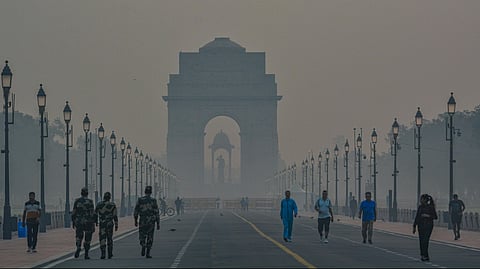

Amid rising pollution levels, Delhi-NCR (National Capital Region) is facing severe air quality conditions for a second consecutive day. The Air Quality Index (AQI) remains firmly in the “severe” category, prompting the authorities to enforce Stage III of the Graded Response Action Plan (GRAP). This phase introduces stringent anti-pollution measures, effective from November 15, 8 a.m., to mitigate the environmental crisis.
The Delhi government has taken decisive action in response to the ongoing crisis by suspending all in-person classes for students up to Class 5. Delhi Chief Minister Atishi announced that these classes would shift online until further notice, ensuring that young children are protected from the hazardous air quality.
The GRAP III restrictions impose a strict ban on specific construction and demolition activities, which are major sources of dust pollution in the capital. Activities such as earthwork, drilling, bricklaying, masonry, and painting are prohibited across Delhi-NCR. Only essential projects, including healthcare, national security, and infrastructure work (such as highways and roads), will be permitted to continue.
To reduce vehicular pollution, GRAP III restricts entry of certain vehicles into Delhi. The ban targets BS-III petrol and BS-IV diesel vehicles in Delhi and major districts like Gurugram, Faridabad, Ghaziabad, and Gautam Budh Nagar. Inter-state buses, with the exception of electric, CNG, and BS-VI diesel models, are restricted from entering Delhi to help cut down on pollution from vehicle emissions. Vehicles carrying essential goods and those with All India Tourist Permits are exempt from these restrictions.
As part of the dust control strategy, authorities are set to intensify road cleaning with mechanized sweepers. Water sprinkling along key traffic corridors and pollution hotspots will be conducted daily before peak traffic hours to minimize airborne dust. Authorities will also oversee the efficient disposal of collected dust, enhancing visibility and air quality across the region.
To further combat dust pollution, all mining activities in Delhi-NCR have been temporarily halted under the new guidelines, adding another layer to the region’s pollution control measures.
The Stage III GRAP guidelines build upon existing measures from Stages I and II, which included increasing public transport options and encouraging restricted outdoor activities. The pollution watchdog continues to monitor air quality and may implement additional restrictions if conditions do not improve.
Delhi remains under close watch as these restrictions take effect, with authorities urging residents to limit outdoor exposure and stay informed about air quality updates.
(Input from various sources)
(Rehash/Dr. Sreelekshmi P/MSM)
